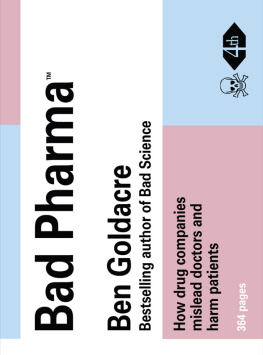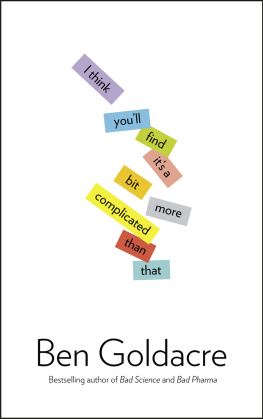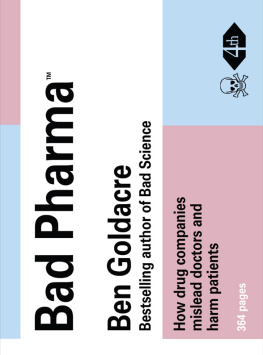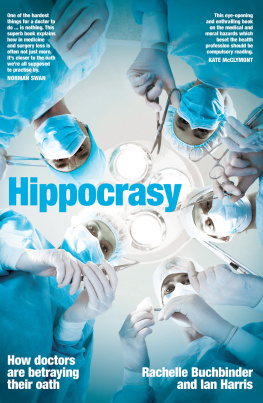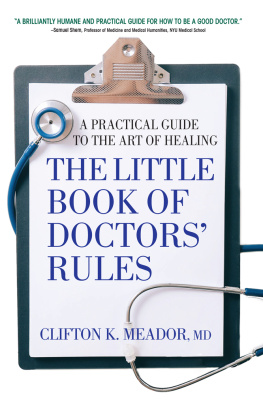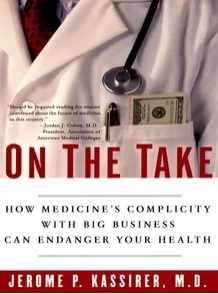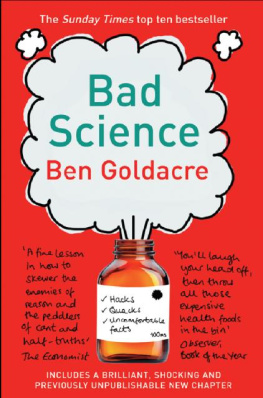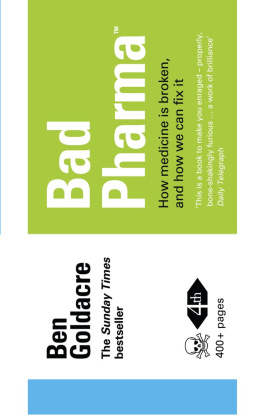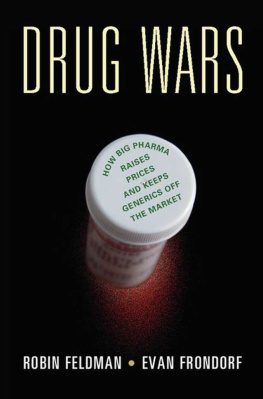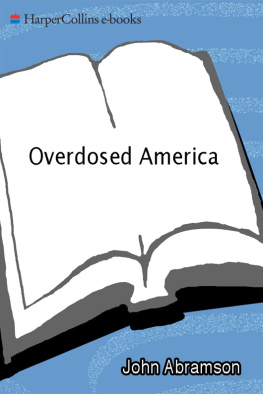BEN GOLDACRE
Bad Pharma
How Drug Companies Mislead Doctors and Harm Patients
FOURTH ESTATE London
To whom it may concern
CONTENTS
Medicine is broken. And I genuinely believe that if patients and the public ever fully understand what has been done to them what doctors, academics and regulators have permitted they will be angry. On this, only you can judge.
We like to imagine that medicine is based on evidence, and the results of fair tests. In reality, those tests are often profoundly flawed. We like to imagine that doctors are familiar with the research literature, when in reality much of it is hidden from them by drug companies. We like to imagine that doctors are well-educated, when in reality much of their education is funded by industry. We like to imagine that regulators only let effective drugs onto the market, when in reality they approve hopeless drugs, with data on side effects casually withheld from doctors and patients.
Im going to tell you how medicine works, just over the page, in one paragraph that will seem so absurd, so ludicrously appalling, that when you read it, youll probably assume Im exaggerating. Were going to see that the whole edifice of medicine is broken, because the evidence we use to make decisions is hopelessly and systematically distorted; and this is no small thing. Because in medicine, doctors and patients use abstract data to make decisions in the very real world of flesh and blood. If those decisions are misguided, they can result in death, and suffering, and pain.
This isnt a simple story of cartoonish evil, and there will be no conspiracy theories. Drug companies are not withholding the secret to curing cancer, nor are they killing us all with vaccines. Those kinds of stories have, at best, a poetic truth: we all know, intuitively, from the fragments weve picked up, that something is wrong in medicine. But most of us, doctors included, dont know exactly what.
These problems have been protected from public scrutiny because theyre too complex to capture in a soundbite, or even 3,000 words. This is why theyve gone unfixed by politicians, at least to some extent; but its also why youre holding a book of over four hundred pages. The people you should have been able to trust to fix these problems have failed you, and because you have to understand a problem properly in order to fix it yourself, this book contains all that you need to know.
So, to be clear, this whole book is about meticulously defending every assertion in the paragraph that follows.
Drugs are tested by the people who manufacture them, in poorly designed trials, on hopelessly small numbers of weird, unrepresentative patients, and analysed using techniques which are flawed by design, in such a way that they exaggerate the benefits of treatments. Unsurprisingly, these trials tend to produce results that favour the manufacturer. When trials throw up results that companies dont like, they are perfectly entitled to hide them from doctors and patients, so we only ever see a distorted picture of any drugs true effects. Regulators see most of the trial data, but only from early on in a drugs life, and even then they dont give this data to doctors or patients, or even to other parts of government. This distorted evidence is then communicated and applied in a distorted fashion. In their forty years of practice after leaving medical school, doctors hear about what works through ad hoc oral traditions, from sales reps, colleagues or journals. But those colleagues can be in the pay of drug companies often undisclosed and the journals are too. And so are the patient groups. And finally, academic papers, which everyone thinks of as objective, are often covertly planned and written by people who work directly for the companies, without disclosure. Sometimes whole academic journals are even owned outright by one drug company. Aside from all this, for several of the most important and enduring problems in medicine, we have no idea what the best treatment is, because its not in anyones financial interest to conduct any trials at all. These are ongoing problems, and although people have claimed to fix many of them, for the most part they have failed; so all these problems persist, but worse than ever, because now people can pretend that everything is fine after all.
Thats a lot to stand up, and the details are much more horrific than that paragraph makes it sound. There are some individual stories that will make you seriously question the integrity of the individuals involved; some that will make you angry; and some, I suspect, that might make you very sad. But I hope you will come to see that this is not just a book about bad people. In fact, its possible for good people, in perversely designed systems, to casually perpetrate acts of great harm on strangers, sometimes without ever realising it. The current regulations for companies, doctors and researchers create perverse incentives; and well have better luck fixing those broken systems than we will ever have trying to rid the world of avarice.
Some people will say that this book is an attack on the pharmaceutical industry, and of course it is. But its not only that, and its not unbounded. I suspect that most of the people who work in this industry are fundamentally good-hearted, and there is no medicine without medicines. Drug companies around the world have produced some of the most amazing innovations of the past fifty years, saving lives on an epic scale. But that does not allow them to hide data, mislead doctors and harm patients.
Today, when an academic or doctor tells you that they are working for the pharmaceutical industry, they often do so with a look of quiet embarrassment. I want to work towards a world where doctors and academics can feel actively optimistic about collaborating with industry, to make better treatments and better patients. This will require big changes, and some of them have been a very long time coming.
To that end, because the stories I am telling you are so worrying, Ive tried to go beyond simply documenting the problems. Where there are obvious fixes, Ive set out what they are. But Ive also included, at the end of each chapter, some suggestions on what you can do to improve things. These are tailored to whoever you might be: a doctor, a patient, a politician, a researcher, a regulator or a drug company.
More than anything, though, I dont want you to lose sight of one thing: this is a pop science book. The tricks and distortions documented in these pages are beautiful, and intricate, and fascinating in their details. The true scale of this murderous disaster only fully reveals itself when the details are untangled. Good science has been perverted on an industrial scale, but this has happened slowly, and evolved naturally, over time. This has all been perpetrated by ordinary people, but many of them may not even know what theyve done.
I want you to find them, and tell them.
Whats coming
The book follows a simple trajectory.
We start by defending our central claim: industry-sponsored studies are more likely to produce results that flatter the sponsors drug, which has now been demonstrated, beyond any doubt, by current research. In this section we also encounter the idea of a systematic review for the first time. A systematic review is an unbiased survey of all the evidence on a given question. It is the best-quality evidence that can be used, and where they exist, systematic reviews are used for evidence throughout this book, with individual studies described only to give you a flavour of how the research has been done, or how mischief has been made.
Then we look at how the pharmaceutical industry manages to create all these positive trials for its drugs. Our first stop is to review the evidence showing that unflattering trial data can simply be withheld from doctors and patients. Companies are perfectly entitled to conduct seven studies, but only publish the two positive ones, and this behaviour is commonplace. Whats more, it happens in every field of science and medicine: from basic laboratory research, where selective publication fills the literature with false positive findings, wasting everyones time; through early research trials, where evidence that drugs might be dangerous is hidden from view; and on to major trials used to inform everyday clinical practice. Because so much trial data is withheld from doctors and patients, we can have no clear idea of the true effects of the treatments that we use every day in medicine. The stories in this section go from antidepressants, through statins, cancer drugs, diet pills, and right up to Tamiflu. Governments around the world have spent billions of dollars to stockpile this flu drug, in fear of a pandemic, and yet the evidence on whether it reduces the rate of pneumonia and death is being withheld right now, to this day.
Next page
